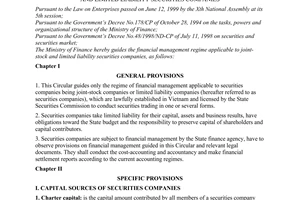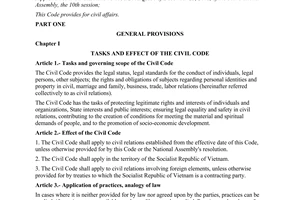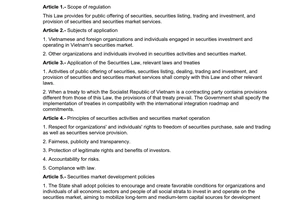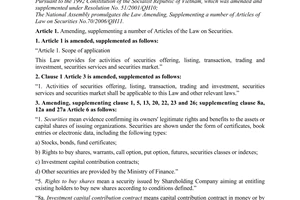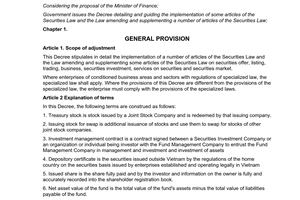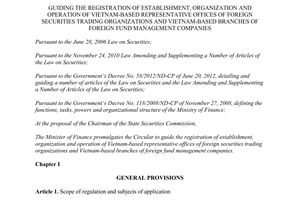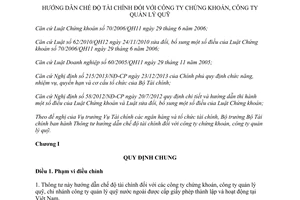Nội dung toàn văn Circular No. 146/2014/TT-BTC on finance regulations for securities companies asset management companies
|
MINISTRY OF FINANCE |
SOCIALIST
REPUBLIC OF VIETNAM |
|
No: 146/2014/TT-BTC |
Hanoi, October 6, 2014 |
CIRCULAR
ON FINANCE REGULATIONS FOR SECURITIES COMPANIES, ASSET MANAGEMENT COMPANIES
Pursuant to the Law on Securities No. 70/2006 / QH11 dated June 29, 2006;
Pursuant to the Law No. 62/2010 / QH12 dated November 24, 2010, amending and supplementing a number of articles of the Law on Securities Law No. 70/2006 / QH11 dated June 29, 2006;
Pursuant to the Law on Enterprise No. 60/2005 / QH11 dated November 29, 2005;
Pursuant to the Government’s Decree No. 215/2013 / ND-CP dated December 23, 2013, defining functions, tasks, powers and organizational structure of the Ministry of Finance;
Pursuant to Decree No. 58/2012 / ND-CP dated June 20, 2012, providing instructions on the implementation of a number of articles of the Law on Securities and the Law amending and supplementing a number of articles of the Law on Securities;
At the request of the Director of the Financial Department and banks and financial institutions, the Minister of Finance promulgates this Circular guiding the financial regime for securities companies, fund management companies .
Chapter I
GENERAL PROVISIONS
Article 1. Scope
1. This Circular provides guidance on the financial regulations for securities companies, asset management companies, branches of foreign fund management company licensed to establish and operate in Vietnam.
2. Branches in Vietnam of foreign asset management companies shall implement financial regulations as prescribed in Article 21 of Circular No. 91/2013 / TT-BTC dated June 08, 2013 on the registration for establishment, organization and operation of representative offices of foreign securities operation organizations, branches of foreign asset management companies in Vietnam and the provisions in this Circular
Article 2. Regulated entities
1. Every securities company licensed to establish and operate in Vietnam
2. Every asset management company, branch of a foreign asset management company (hereinafter referred to as the fund management company) licensed to establish and operate in Vietnam.
3. Organizations and individuals involved in the operation of securities companies, asset management companies.
Article 3. Responsibilities
President of the Board of Directors or President of the Member Board or General Director (Director) of securities companies, asset management companies shall be responsible with the law and the State management agencies in complying with finance, accounting, auditing regulations of the securities company, the asset management company.
Chapter II
MANAGEMENT AND USE OF CAPITAL AND ASSETS
Article 4. Equity
1. Charter capital
a) The increase, decrease of the charter capital of a securities company shall comply with the provisions of the law on the establishment, organization and operation of securities companies;
b) The increase or decrease of the charter capital of the asset management company shall comply with the provisions of the law on the establishment, organization and operation of the asset management company;
2. Share premium is the difference between the face value of the stock with the actual value obtained from its offering (if any).
3. The additional reserve fund of charter capital, operational risk and financial reserve funds
4. Undistributed earnings
5. Other sources of capital under the legal ownership of securities companies, asset management companies.
Article 5. Use of capital and assets
1. Securities companies, asset management companies shall be responsible for the management, use and monitoring of all available assets and capital, doing accounting in accordance with current accounting regulations; fully, accurately and timely recording the use, fluctuation of capital and assets in the course of operation, clearly defining the responsibilities and handling for each department or individual for damage or loss of assets and capital.
2. Securities companies, asset management companies shall use capital and assets for their business operation in accordance with the Law on Securities and provisions in this Circular.
a) Securities companies shall:
- Manage separately between the capital and assets of securities companies and those of customers; not appropriate customers’ capital and assets in any form.
- Comply with restrictions on borrowing, lending, investment in accordance with the law on the establishment, organization and operation of securities companies.
a) Asset management companies shall:
- Ensure the independent and separate management of assets of each fund, each securities investment company, mandated customer’s capital and assets of the asset management company.
- Not use raised capital for finance investment; operation capital for financial investment shall be derived from the equity.
- Comply with the responsibilities and obligations of the asset management company, reduce the operation of the asset management company in accordance with the law on the establishment, organization and operation of the asset management company.
3. Competence to decide on the investment project, the loan, purchase, sale, liquidation, rent, lease contracts of assets shall comply with the law on the establishment, organization and operation of securities companies, asset management companies and regulations of company’s operating organizations.
4. The rent, lease, mortgage, pawn, sale or liquidation of the assets of the securities company, the asset management company shall comply with the provisions of the Civil Law, securities laws, regulations of company’s operating organizations and the provisions of the relevant legislation.
Chapter III
FINANCIAL PRUDENCE
Article 6. Principles of financial prudential
1. Securities companies, asset management companies shall maintain the financial prudential ratios, ensure liquidity and compliance with the relevant provisions of the Securities Law, Law Amending and Supplementing a number articles of the Securities Law and the guidelines.
2. The financial prudence shall be ensured through :
a) Purchase of professional liability insurance or setting up the investor protecting funds, provision funds for loss and compensating for damages under the provisions of Article 11 of this Circular;
b) Making provisions for devaluation of securities as prescribed in Article 7 of this Circular.
b) Making provisions for losses on securities investment as prescribed in Article 8 of this Circular.
b) Making provisions for operational risk and financial reserve funds as prescribed in Article 14 of this Circular.
dd) Making provisions for bad debts in compliance with regulations for businesses.
Article 7. Provision for devaluation of securities
1. Conditions for making provisions
a) The securities are recorded at cost prices by securities companies, asset management companies in accordance with the law on accounting.
b) The actual prices of securities freely traded on the market at the time of making the financial statement are lower than their prices on the accounting book.
c) Securities are restricted from transfer under the provisions of law and provisions for devaluation of treasury stock are not allowed.
2. The method of provision:
The level of securities devaluation provision shall be calculated by the following formula:
|
The level of securities devaluation provision |
= |
Number of devaluated securities at the time of making the financial statement |
x |
|
Price of securities on the accounting book |
- |
The actual securities price on the market |
|
3. Determination of the actual securities price on the market for provision:
a) For listed securities, traded registered securities, traded securities price for provision shall be the actual securities price at the Stock Exchange of the latest trading date before the date of setting up the provision, specifically :
- For securities listed on the Stock Exchange, the actual price on the market shall be the closing price on the latest trading date before the date of setting up the provision
- For traded registered securities (traded registered stocks in UPCOM), the actual price on the market shall be the closing price on the latest trading date before the date of setting up the provision.
b) For unlisted and unregistered securities:
- Securities actual price on the market which is a basis for provision shall be the average price of the actual transactions according to the quoting of 3 companies trading securities at the latest time of setting up provision but not more than one month before the date of setting up the provision.
If securities do not have arising actual transactions during such period, provision shall not be set up.
-The manager or administrator of securities companies selected to quote shall not have relationship with the manager and administrator of the securities companies/asset management company quoted as prescribed in the Law on Securities.
-Securities companies quoting are entitled to charge for securities companies / asset management companies requesting to quote the quotation and shall be responsible for the accuracy and truthfulness of the information provided. Charge rates shall be mutually agreed
c) For delisted or suspended securities from the 6th trading date onwards, the actual securities price shall be the book value on the latest date of making the balance sheet.
4. Rules for provisions:
a) Provisions for every kind of investment securities that devaluate compared to their book values when the financial statement is made shall be set up and included in the list of security devaluation provisions, which is the basis for inclusion in financial expenses of the securities company or asset management company;
b) Every securities company and asset management company shall set up the provision at the end of accounting periods when the quarterly or annual financial statement is made;
c) If the actual value of the securities can not be determined, the securities companies, asset management companies must not set up the securities devaluation provision.
5. Handling of securities devaluation provision :
a) The handling of securities devaluation provision shall be at the end of the quarter, year on the date of the quarterly, annual financial statements are made ;
b) If the securities devaluation provision set up in a period is equal to the balance of the provision set up in the previous period, it shall not be set up;
c) If the provision set up in a period is higher than the balance of the unused provision in the previous period, the difference shall be included in financial expense;
d) If the provision set up in a period is lower than the balance of the unused provision in the previous period, the company shall reverse the inclusion of the difference in expense and reduce the financial expense/record a decrease in financial expense.
Article 8. Provision for losses on long-term financial investments
1. Securities companies, asset management companies shall set up a provision for losses on long-term financial investments as prescribed in the law for businesses.
2. The provision for losses on long-term financial investments shall be set up at the end of the accounting period when the annual financial statement is made
Chapter IV
MANAGEMENT OF REVENUES, EXPENSES
Article 9. Revenue and Income
Revenue and income from securities companies, asset management companies shall include:
1. Revenues from business operation
a) Revenues from business operation of a securities company include:
- Revenue from securities brokerage and products of securities brokerage (deputed account);
- Revenue from proprietary trading
- Revenue from issue guarantee, issue broker
- Revenue from finance consultation
- Revenue from securities investment consultation
- Revenue from mandate, bidding
- Revenue from securities depository ;
- Revenue from operations
b) Revenues from business operation of an asset management company include :
- Revenue from securities investment fund management and securities investment company
- Revenue from securities investment consultation
- Revenue from investment portfolio consultation
- Revenue from reward when the investment results of the fund, the portfolio exceed the reference rate based on contracts with customers;
- Revenue from issuing fund certificates or stocks from securities Investment Company
- Revenue from fees from investment as designated for foreign investors;
- Revenue from repurchase, conversion of fund certificates;
- Revenue from operations
2. Revenues from financial activities include those from:
a) Contribution of capital;
b) Interest on deposits;
c) Exchange differences
d) Revenue from dividends and bond interest of proprietary trading self and dividends, bond interest, the difference between purchase and sale of securities of financial investments; Revenue of loans, deposits;
dd) Estimated revenue from stocks and bond interest ;
e) Revenue from financial activities and investment
3. Other income includes revenues from the lease, liquidation or sale of fixed assets which are not used for the securities trading ; revenue from penalty charges; revenue from insurance indemnity for asset losses; the other legitimate incomes.
Article 10. Rules for determining revenues
Securities companies, asset management companies shall record revenue and other income in accordance with the accounting standards for revenue and other income, as follows:
1. Revenue shall be the total value of the economic benefits of securities companies, asset management companies in the accounting period.
2. The revenue arising in the period shall have valid invoices and/or documentary evidence and be fully accounted for.
3. Revenues from exchange differences from revaluation of foreign currency and gold shall be recorded in accordance with accounting standards and provisions of current laws
Article 11. Expenses
Operation expenses of securities companies, asset management companies shall be the actual costs incurred during the period related to business activities, including: 0}
1. Operation expenses
a) For securities companies, operation expenses shall include:
- Expense on securities brokerage ;
- Expense on proprietary trading
- Expense on issue guarantee, issue brokerage
- Expense on consultation
- Expense on securities depository ;
- Expense on mandate, bidding
- Expense on professional liability insurance for the securities operation in securities company or expense on setting up investor protection fund to indemnify the damages to investors due to technical problems and staff’s negligence in their work as prescribed in Article 71 of the Securities Law. Setting up and using the investor protection fund shall comply with the law;
- Other expenses of operation
b) For asset management companies, operation expenses shall include:
- Expense on securities investment asset management and administrative expense of securities investment company
- Expense on establishment of the fund, securities investment companies
- Expense on securities investment portfolio management and expense on consultation of securities investment.
- Expense on purchase of professional liability insurance for practitioner in asset management companies or setting up loan loss provision and indemnifying the damages for investors due to technical problems and practitioner’s negligence in their work; indemnify for investors and open ended fund if the open ended fund is wrongly valuated as prescribed in Article 71 of the Securities Law Setting up and using the investor protection fund shall comply with the law;
- Other operating expenses
2. Expense of financial activities shall include the expenses related to outside investment activities, such as expense on pay loan interest for securities companies, raising capital expense, investment expense, exchange differences; securities devaluation provision, provision for devaluation of finance investments, bad debt provision; Other financial expenses.
3. Business administration expense
a) Expense on fixed asset depreciation according to current regulations, expense on maintenance and repairing fixed assets
b) Expense on tools, instruments; cost of raw materials, fuels, and materials;
c) Business trip allowances
d) Expense on purchased services: electricity, water, phone, repairing fixed assets; auditing, legal services, property insurance, accident insurance, stationery, transport, fire prevention, fire fighting; use of the equipment system of the Securities Exchange, monitoring in accordance with law, hiring experts and or other purchased services;
dd) Expenses on advertising, marketing, promotion, reception, festivities, transaction, foreign, conferences, meetings, professional training and other expenses as prescribed ;
e) Expense on salary and salary-related payments under the current regulations prescribed by the Board of Directors / Board of Member / Chairman of the Company under the regulations of the Company;
g) Deductions as prescribed by the State, such as social insurance, health insurance, trade union fees, unemployment insurance .
4. Expense on taxes, charges and fees as prescribed by law
5. Other legitimate expenses such as:
a) Expense on liquidation, lease or sale of assets;
b) Expense on fees payable to the association, organization of which the securities company or asset management company is a member;
c) Other expenses
Article 12. Principles of determining expenses
1. Operation expenses of securities companies, asset management companies shall be the expense incurred during the period related to business activities.
2. Expense recorded shall comply with the principle of compatibility between revenues and expenses, have enough legal documents as prescribed by law.
3. The following Expenses shall not be accounted for by securities companies, asset management companies.
a) Expenses covered by other funding sources ;
b) Expenses not related to business activities, expenses without valid documents;
c) Expenses accounted for but not actually spent ;
d) Expenses on fines for administrative violations, financial regulation violations
e) Expenses that are not deductible when determining enterprise income taxable income under the provisions of the law on enterprise income tax income.
Chapter V
PROFIT AND SETTING UP FUNDS
Article 13. Operation profit
Operation profit of securities companies, asset management companies shall be the total profit from professional operation, financial activity and other activities
Article 14. Distribution of profits
1. Conditions for the distribution of profits and principles of the distribution of profits shall be complied with the provisions of the Circular guiding the establishment and operation of securities companies, asset management companies and other provisions of the relevant law. Securities companies, asset management companies shall share the profits to members, shareholders after meeting the conditions specified in the law.
2. Operation profit of securities companies, asset management companies after offsetting losses of the last year under the provisions of the Law on Enterprise income tax and pay enterprise income tax shall be distributed as follows
a) Add 5% of the profit to additional reserve fund of charter capital until the balance is equal to 10% of the charter capital;
a) Add 5% of the profit to operational risk and financial reserve funds until the balance is equal to 10% of the charter capital;
3. The remaining profit distribution shall be decided by the Shareholder Meeting / Member Board / Owners of securities companies, asset management companies.
Article 15. The purpose of the Funds
1. Additional reserve fund of charter capital shall be used for annual supplementation of charter capital of the securities company or asset management company as decided by their Shareholder Meeting/ Board Member / Owners . The annual set-up level shall be decided by the Shareholder Meeting / Member Board/ Owners of securities companies, asset management companies under the regulations of the companies.
2. Operational risk and financial reserve funds shall be used to cover the remaining of the property loss and damage incurred in the course of operation after being offset by indemnities paid by the organizations, individuals causing the damage, the insurers. Investor protection fund shall be used for securities firms. Risk reserve and loss indemnity fund shall be used for asset management companies and the provision set up in expense shall be used. Board of Directors /member Board of securities companies, asset management companies shall manage and use this fund.
3. It is strictly forbidden that securities companies, asset management companies use the additional reserve fund of charter capital, and operational risk and financial reserve funds to pay dividends.
Chapter VI
ACCOUNTING, FINANCIAL AUDIT AND FINANCIAL INSPECTION REGULATIONS
Article 16. Accounting Audit regulations
1. The fiscal year of securities companies, asset management companies shall begin on January 1 and ends on December 31 of the calendar year. The first fiscal year of securities companies, asset management companies shall begin from the date of establishment and end on December 31 of the year. If the first fiscal year is shorter than 4 (four) months, that year’s financial statements shall be audited along with the financial statements for the following year.
2. Securities companies, asset management companies shall implement the accounting regulations as prescribed by the Ministry of Finance, and fully record the original documents, update the accounting books and account fully, promptly, truly, accurately, objectively the economic and finance activities.
3. The annual financial statements and interim financial statements of the securities company, the asset management company must be audited by an audit organization approved by the State Securities Commission before they are submitted to the shareholder meeting / member board / owners for review and approval in accordance with the regulations of the company. Auditing the financial statements shall comply with the law guiding the establishment and operation of securities companies, asset management companies.
4. President of the Board of Directors/ President of the Board of Members/ President of the company or General Director (Director) of securities companies, asset management companies shall be responsible for accuracy, truthfulness of the financial statements
Article 17. Report on the financial situation and securities.
1. Financial statement of securities companies, asset management companies shall include:
a) Annual financial statements, interim financial statements , quarterly financial statements in accordance with accounting regulations applied to securities companies, asset management companies;
b) Annual financial statements, interim financial statements of securities companies, asset management companies shall comply with the provisions of paragraph 3 of Article 16 of this Circular.
2. Report on the securities investment shall include:
a) Report on the securities investment , setting up and processing for securities investment devaluation provision (Appendix 1 enclosed with this Circular) which shall include detailed explanation about the number and type of securities that securities companies, asset management companies currently hold, value according to books and actual value at the time quarterly and annually financial statements are made; source of reference prices as a basis for setting up the provision; reverting the provision;
b) Report on long-term financial investments; setting up and processing for loss provision in long-term financial investments (Appendix 2 this Circular) which shall include detailed explanations about the contribution of capital, outside investment of securities companies, asset management companies.
3. Deadline for submission of financial statements:
a) The deadline for submission of annual financial statements audited by an auditing organization approved by the State Securities Commission shall be within 90 days after the end of the fiscal year;
b) The deadline for submission of the interim financial statements audited by the audit organization approved by the State Securities Commission shall be within 45 days after the end of the first 6 months of the fiscal year
c) The deadline for submission of quarterly financial statements shall be at the latest on the 20th day of the first month of the following quarter;
d) The deadline for submission of reports on securities investment as prescribed in paragraph 2 of this Article shall be within 30 days after the end of the fiscal year.
4. Recipients
Securities companies, asset management companies shall make and submit the reports specified in Clauses 1 and 2 of this Article to the State Securities Commission. .
5. The information disclosure on annual financial statements of securities companies, the asset management company shall comply with the provisions in the Securities Law, the provisions on information disclosure on the securities market and the amended ,supplemented or replaced documents (if any).
Article 18. Inspection and actions against financial violations
1. Form of finance inspection
a) Periodical or irregular financial inspection;
b) Inspection according to the special subject at the request of finance management.
2. Inspecting agencies .
a) State Securities Commission shall:
- Comprehensively inspect and monitor the operations of securities companies, asset management companies, including the financial activities.
- Report to the Ministry of Finance on the violations, the problems related to the implementation of the financial regulations of the securities companies, asset management companies detected during the inspection and supervision for improvements in regulations and policies.
b) Ministry of Finance:
The Ministry of Finance shall inspect the finance management and comply with financial regulations of securities companies, asset management companies to improve financial management regulations as prescribed by law on inspection.
Chapter VII
RESPONSIBILITIES OF ORGANIZATIONS AND INDIVIDUALS INVOLVED
Article 19. Securities companies, fund management companies shall
1. Comply with the financial regulations of this Circular, the provisions of the securities laws and securities market, the provisions of the tax law.
2. Implement the reporting regulations under the provisions of this Circular and the provisions of the securities law.
Article 20. State Securities Commission shall:
Inspect and supervise the finance of the financial securities companies, asset management companies under the provisions of this Circular.
Chapter VIII
IMPLEMENTATION
Article 21. Effect
1. This Circular takes effect from November 21, 2014 and is applicable from financial year 2014.
2. This Circular shall replace the Ministry of Finance’s Circular No. 11/2000 / TT-BTC dated February 01, 2000, guiding the financial management regulations for joint-stock and limited liability securities companies .
3. Any problems arising in the course of implement should be reported to the Ministry of Finance for study, consideration and solving. /.
|
|
PP. MINISTER |
------------------------------------------------------------------------------------------------------
This translation is made by LawSoft and
for reference purposes only. Its copyright is owned by LawSoft
and protected under Clause 2, Article 14 of the Law on Intellectual Property.Your comments are always welcomed
